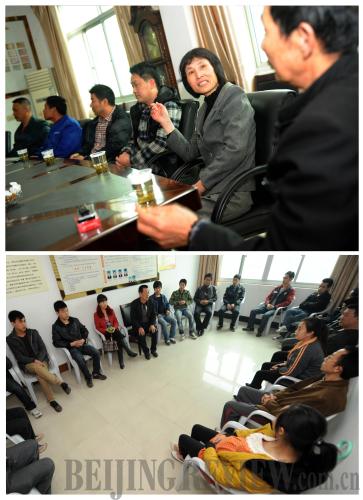|
 |
|
BOTH SIDES: Representatives of employers (upper) and employees (lower) from cap-making enterprises in Nanjian Village in Wenling, Zhejiang Province, discuss wage adjustments in April 2012 (HAN CHUANHAO) |
Each year, the employer signs a new collective contract with the workers, making wage adjustments according to local GDP and consumer price index.
"Trade unions act as a bridge between workers and employers to find an appropriate solution that meets the interests of both and helps workers get the wages they deserve," said Chen Fuqing in Wenling.
Increasing effectiveness
"In order to come to an agreement between employers and employees, wage negotiators need to be equipped with the right knowledge, including relevant laws and regulations, economic management, negotiation skills and detailed information of any company involved," said Chen Ningde with the Dasailu Food Processing Co. Ltd. in Nanning. "Only after you are 100-percent ready, can you have the confidence to talk with both sides."
According to him, the problem with those wage negotiators who are unable to perform their duty effectively is that they take action before they learn enough. "This can easily put them in an awkward situation," he said.
Besides this, there are other obstacles that are frequently met when conducting wage negotiations.
"Many employers are not willing to sit down and talk about wages with their workers," said Zhang with the ACFTU. "Some local governments have not yet realized the significance of collective bargaining to boost their regional economic and social development.
"Many laborers, especially those in construction and catering industries, are not aware of collective contracts. They don't have any leverage to demand employers to sit down for collective wage negotiations," said Zhao Wei, Deputy Director of the China Labor Studies Center at Beijing Normal University. "It will take some time before collective wage negotiations are widely adopted."
A lack of relevant laws and regulations has also hampered the negotiating process. "Currently, there is no law in China requiring companies to sign collective contracts with their employees, which explains why there is little incentive for them to do so," Zhao added.
Email us at: yuanyuan@bjreview.com | 